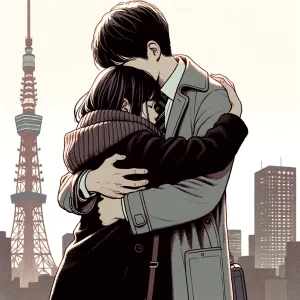ラブ・ストーリーは突然に [Rabu Sutōrī wa Totsuzen ni]
小田和正 [ODA Kazumasa]
Words & Music : 小田和正 [ODA Kazumasa]
“Love Story wa Totsuzen ni” is a song by Kazumasa Oda, released in 1991. It was created as a tie-up song for the TV drama “Tokyo Love Story YT.” The song sold about 2.7 million copies, setting a sales record in Japan at the time.
The drama “Tokyo Love Story,” based on Fumi Saimon’s popular manga, reflected the atmosphere of the bubble economy and was supported by young women, becoming a big hit. By the way, Japanese TV dramas produced in the early ’90s came to be called “torendi dorama” (=trendy dramas).
In the drama, “Love Story wa Totsuzen ni” was frequently used as background music, enhancing the storyline.
Let’s first explain the meaning of title “ラブ・ストーリーは突然に / Rabu Sutōrī wa Totsuzen ni”.
- 突然(とつぜん) [totsuzen] : sudden
Literally translated, it means “Love Story Suddenly.” I believe it doesn’t relate to the song’s lyrics. Rather, it seems linked to the content of the drama. If so, it could be “Love Story begins suddenly.”
As an aside, the word “totsuzen / 突然” is an adverb, and “ni / に” is unnecessary. The title’s grammar is completely incorrect, but somehow, it feels natural and even rhythmic. I think it’s a very strategically thought-out title.
何から伝えればいいのか分からないまま時は流れて
nani kara tsutaereba ī no ka wakaranai mama toki wa nagarete
- 何(なに) [nani] : what
- 伝える(つたえる) [tsutaeru] : tell
- いい(いい) [ī] : good
- わからない(わからない) [wakaranai] : not understand
- まま(まま) [mama] : as it is
- 時(とき) [toki] : time
- 流れる(ながれる) [nagarete] : flow
(translation) “As I don’t know what to tell, time flows on.”
One of the themes of this song is the passage of time.
Remember the word “mama / まま.”
浮かんでは消えてゆくありふれた言葉だけ
ukande wa kiete yuku arifureta kotoba dake
- 浮かぶ(うかぶ) [ukabu] : float
- 消える(きえる) [kieru] : disappear
- ありふれた(ありふれた) [arifureta] : commonplace
- 言葉(ことば) [kotoba] : words
In the lyrics, the word order is sometimes reversed, making it hard to interpret them grammatically.
You could translate it as
“Only commonplace words float and disappear.”
However, if you read in the order of the words, it could also be translated as
“Various words float and disappear. And only the commonplace words remain.”
君があんまりすてきだから
kimi ga anmari suteki dakara
ただすなおに好きと言えないで
tada sunao ni suki to ienai de
- 君(きみ) [kimi] : you
- あんまり(あんまり) [anmari] : too
- 素敵(すてき) [suteki] : wonderful
- 素直(すなお) [sunao] : honest
- 好き(すき) [suki] : love
- 言う(いう) [iu] : say
(translation) “Because you are so wonderful,
I just can’t honestly say I love you.”
“Anmari” and “amari” are the same.
“Ienaide” (cannot say) and “ienakute” are the same.
多分もうすぐ雨も止んで二人たそがれ
tabun mōsugu ame mo yande futari tasogare
- 多分(たぶん) [tabun] : maybe
- もうすぐ(もうすぐ) [mōsugu] : soon
- 雨(あめ) [ame] : rain
- やむ(やむ) [yamu] : stop
- 二人(ふたり) [futari] : two person
- たそがれる(たそがれる) [tasogaru] : twilight
(translation) “Maybe the rain will soon stop, and the two of us will be in twilight.”
The origin of “たそがれ / tasogare” is the old Japanese phrase “Ta zo kare” meaning “Who is that?” It then came to refer to the time when it’s hard to recognize faces, i.e., twilight.
Further, it also came to be used colloquially to mean “to ponder.” Here, it has that meaning.
In the song “Lipstick Message (Rouge no Dengon)”, it is used in its original sense.
あの日あの時あの場所で君に会えなかったら
ano hi ano toki ano basho de kimi ni aenakattara
僕等はいつまでも見知らぬ二人のまま
bokura wa itsumademo mishiranu futari no mama
- あの(あの) [ano] : that
- 日(ひ) [hi] : day
- 時(とき) [toki] : time
- 場所(ばしょ) [basho] : place
- 会う(あう) [au] : meet
- 僕(ぼく) [boku] : I
- いつまでも(いつまでも) [itsumademo] : forever
- 見知らぬ(みしらぬ) [mishiranu] : unknown
(translation) “If we hadn’t met on that day, at that time, in that place,
we would remain two strangers forever.”
This part is a hypothetical look back at the past.
It’s like setting a time and place and… it kind of reminds you of the famous movie “Back to the Future” (1985), doesn’t it?

“僕 / Boku” is “I,” and attaching “ら / ra” makes “bokura” (=us). It can also be said as “bokutachi.” “Futari” is “two persons” but frequently appears in the lyrics as a symbolic meaning. “Bokura” and “futari” both mean “two of us.”
誰かが甘く誘う言葉にもう心揺れたりしないで
dareka ga amaku sasou kotoba ni mō kokoro yuretari shinaide
切ないけどそんなふうに心は縛れない
setsunai kedo sonna fū ni kokoro wa shibarenai
- 誰か(だれか) [dareka] : someone
- 甘い(あまい) [amai] : sweet
- 誘う(さそう) [sasou] : invite
- もう(もう) [mō] : already
- 心(こころ) [kokoro] : heart
- 揺れる(ゆれる) [yureru] : sway
- 切ない(せつない) [setsunai] : poignant
- 縛る(しばる) [shibaru] : bind
(translation) “Don’t let sweet words from someone else sway your heart anymore.
It’s poignant, but the heart cannot be bound in that way.”
“切ない / setsunai” is said to be a unique Japanese word that means “painful or bittersweet, with feelings of sadness or longing.” However, many young people use it simply to mean “regretful.”
明日になれば君をきっと今よりもっと好きになる
ashita ni nareba kimi o kitto ima yori motto suki ni naru
そのすべてが僕のなかで時を超えてゆく
sono subete ga boku no naka de toki o koete yuku
- 明日(あした) [ashita] : tomorrow
- なる(なる) [naru] : become
- 今(いま) [ima] : now
- より(より) [yori] : than
- もっと(もっと) [motto] : more
- 全て(すべて) [subete] : all
- 超える(こえる) [koeru] : transcend
(translation) “Tomorrow, I’ll surely love you more than now.
All of it transcends time within me.”
“時を超える / toki o koeru” literally means “to transcend time.” For example, it can be used in the context of music from 1991 reaching people in 2024.
君のためにつばさになる君を守りつづける
kimi no tame ni tsubasa ni naru kimi o mamori tsudzukeru
やわらかく君をつつむあの風になる
yawarakaku kimi o tsutsumu ano kaze ni naru
あの日あの時あの場所で君に会えなかったら
ano hi ano toki ano basho de kimi ni aenakattara
僕等はいつまでも見知らぬ二人のまま
bokura wa itsumademo mishiranu futari no mama
- ため(ため) [tame] : for
- つばさ(つばさ) [tsubasa] : wings
- 守る(まもる) [mamoru] : protect
- 続け る(つづける) [tsudzukeru] : continue
- やわらかい(やわらかい) [yawarakai] : gentle
- つつむ(つつむ) [tsutsumu] : wrap
- 風(かぜ) [kaze] : wind
君のためにつばさになる 君を守りつづける
kimi no tame ni tsubasa ni naru kimi o mamori tsudzukeru
やわらかく君をつつむあの風になる
yawarakaku kimi o tsutsumu ano kaze ni naru
あの日あの時あの場所で君に会えなかったら
ano hi ano toki ano basho de kimi ni aenakattara
僕等はいつまでも見知らぬ二人のまま
bokura wa itsumademo mishiranu futari no mama
今君の心が動いた言葉止めて肩を寄せて
ima kimi no kokoro ga ugoita kotoba tomete kata o yosete
僕は忘れないこの日を君を誰にも渡さない
boku wa wasurenai kono hi o kimi o darenimo watasanai
- 動く(うごく) [ugoku] : move
- 肩(かた) [kata] : shoulder
- 忘れる(わすれる) [wasureru] : forget
- 渡す(わたす) [watasu] : give
(translation) “Now that your heart has moved, I’ll stop the words and draw close to you.
I won’t forget this day, and I won’t let anyone take you away.”

君のためにつばさになる君を守りつづける
kimi no tame ni tsubasa ni naru kimi o mamori tsudzukeru
やわらかく君をつつむあの風になる
yawarakaku kimi o tsutsumu ano kaze ni naru
あの日あの時あの場所で君に会えなかったら
ano hi ano toki ano basho de kimi ni aenakattara
僕等はいつまでも見知らぬ二人のまま
bokura wa itsumademo mishiranu futari no mama
誰かが甘く誘う言葉に心揺れたりしないで
dareka ga amaku sasou kotoba ni kokoro yuretari shinaide
君をつつむあの風になる
kimi o tsutsumu ano kaze ni naru
あの日あの時あの場所で君に会えなかったら
ano hi ano toki ano basho de kimi ni aenakattara
僕等はいつまでも見知らぬ二人のまま
bokura wa itsumademo mishiranu futari no mama
The lyrics that evoke the image of a time machine blend seamlessly into a dramatic love story, making it intriguing. This song often evokes a feeling of acceleration.
The electric guitar backing seems to contribute to this acceleration. Many guitarists copy the introductory part.

YouTube Search “Love Story wa Totsuzen ni – Kazumasa Oda “
This article is the revised 2024 blog version. The video version is below.
Thanks for reading! Feel free to comment if you have any feedback or questions.
Follow me on X.



